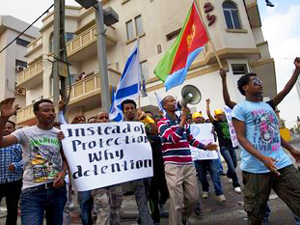
JERUSALEM (AP) – Just a few months ago, Israel was in the midst of a nationwide uproar over the tens of thousands of African migrants who have poured into the Jewish state. Today, that influx has slowed dramatically, following a series of measures meant to halt the new arrivals.
The quick results are testament to a get-tough approach that has included the rapid construction of a soon-to-be-completed fence along the border with Egypt’s Sinai peninsula, and a new policy of detaining Africans upon arrival.
But the strategy has come with a price: Advocacy groups accuse Israel of violating international refugee law by cooperating with Egyptian security personnel to round up migrants on the border. They also say more than a thousand Africans are now languishing in mass detention centers set up to hold them.
Israeli military spokeswoman Lt. Col. Avital Leibovich said she had no immediate information on whether Israeli and Egyptian forces were cooperating in rounding up migrants. Government spokesman Mark Regev had no comment when asked if Israel was carrying out this practice.
Israel, which contends that most of the Africans are not bona fide refugees and are merely looking for work, still has no answer for what to do with the roughly 60,000 Africans living in limbo in city slums.
Danny Danon, who heads a group of lawmakers pushing to expel all unauthorized migrants, credits the border fence and a new policy of long-term detention that makes it impossible for migrants to work and send money back home.
“I think Israeli society woke up, albeit too late,” said Mr. Danon, a member of the governing Likud Party. “But (now) there is an understanding that while we’re a Jewish state sensitive to refugees, we cannot become a safe haven for hundreds of thousands of Africans who want to improve their quality of life.”
The influx of Africans over the past seven years has ignited a debate over whether Israel’s role as a sanctuary for Jews after the Holocaust obligates it to open its doors to others escaping misery and persecution. But as the number of Africans has grown, some Israelis have said the country’s Jewish character could be threatened by the migrants. That, and a series of crimes blamed on the Africans, has led to a harsh, sometimes violent backlash.
Migrants have been attacked in several cases and politicians have called them criminals, a “national scourge” and “a cancer in our body.”
Israel is far from alone in its dilemma: European countries have sought to prevent tens of thousands of people from reaching the continent by boat from Africa and have started implementing a range of border control measures on land and on the high seas. Italy generally puts them into holding centers, then they are sent home if there is no case for political asylum. In Greece, detention camps have been established similar to those built in Israel. In 2011, at least 1,500 people, including women and children, drowned in the Mediterranean Sea trying to reach Europe, according to a recent report by Amnesty International.
Legally, Israel cannot deport most of the migrants because the overwhelming majority–some 85 percent–come from Sudan, an enemy state, and Eritrea, repressive regimes with miserable human rights records. As a signatory to an international treaty on refugees, Israel cannot forcibly return people to countries where they face persecution.
Still, the migrants’ swelling numbers and public sentiment against them propelled the government to start clamping down. In June, it began forcing out citizens of South Sudan, a state that has friendly relations with Israel, offering them cash to leave and threatening to detain them if they didn’t depart. Most of the original total of 2,000 left, the Interior Ministry says.
The government’s main effort, however, has been focused on keeping more unsanctioned migrants from entering. In June, it began enforcing a recently amended law that lets authorities detain migrants for three years and in some cases, indefinitely.
At the same time, the government is expanding its detention facilities and rushing to complete within months a 150-mile fence along the border with Egypt meant to keep out both Africans and Islamic militants.
Sigal Rozen of the Hotline for Migrant Workers, an advocacy group that helps the Africans, says the government is misleading the public into thinking the fence and detention are the main reasons the flow has slowed.
Related news:
- Backlash, mob attacks against African migrants in Israel (FCN, 06-13-2012)
- Atlanta Jewish Times suggests need to “order a hit” on Pres. Obama (FCN, 01-26-2012)
- Boycott targets Israeli apartheid (FCN, 05-12-2011)
- The Unholy Alliance Between Israel and South Africa’s Apartheid Regime (FCN, 12-23-2010)
- Activists: Time for Blacks to speak out against Israeli violence (FCN, 01-14-2009)
- South African Archbishop likens Palestinian life to life under apartheid (FCN, 11-16-2007)












